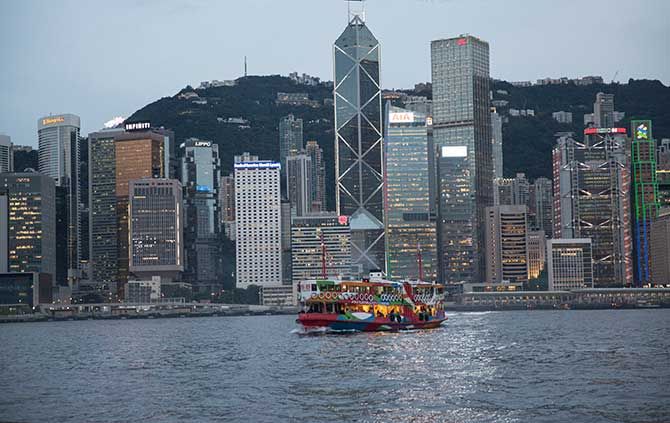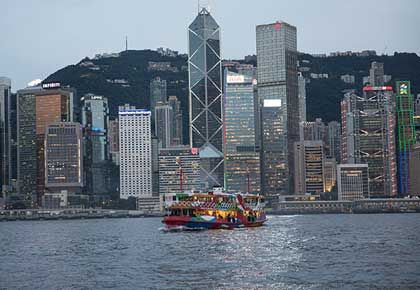'Leaders of the Indian community in Hong Kong had broached the idea of developing the Andaman and Nicobar islands for investment and setting up manufacturing units,' points out Rup Narayan Das.

At a a time when Hong Kong has been in the media limelight in view of threats to its autonomy as enshrined in the Basic Law, its mini constitution, it is worthwhile to revisit the Indian connection to this erstwhile British colony, handed over to Communist China on July 1, 1997.
China's National People's Congress on May 28, 2020 passed the security law which empowers Beijing to deploy its security forces in Hong Kong aimed at throttling what Communist China sees as 'secession, subversion and terrorism'.
Although a majority of its population in Hong Kong are ethnic Chinese, a section are non-ethnic Chinese -- Eurasians, Portiere, and South Asians from India, Pakistan and Bangladesh.
According to some estimates, there are about 4,518 Indians excluding about 17,500 having Indian passports.
While numerically their number is not impressive, Indians have been playing a very significant role in Hong Kong's economy.
The Indian community's links with Hong Kong can be traced back to the British East India Company.
When the British naval force landed in Hong Kong in January 1841 and hoisted the British flag at Possession Point, about 2,700 Indian troops were witness to the event.
The Treaty of Nanking that ceded the Chinese territory to the British makes a mention of the Indians.
It was in India that the colony raised its first military force -- the Hong Kong Regiment recruited in 1890.
The colonial government recruited personnel in the police and administration to man services like health, education, communication.
It was much cheaper and quicker to recruit people from India which was then part of the British empire.
William Jardine -- founder of Hong Kong's oldest trading firm, Jardine & Matheson -- worked in Calcutta for the East India Company before moving out to Hong Kong.
Jardine was a surgeon on one of the East India Company's ships before starting his trading company.
Jardine & Matheson continues to be one of the largest business conglomerates in Hong Kong.
Among the Indian business community, the Parsis were perhaps the earliest to settle down and do business in Hong Kong.
The Paris came along with the British from Canton (present day Guangzhou) in the mid-1880s.
Supremely occidental, the Parsis were loved by the British for their club etiquette, their Western attitudes, philanthropy and fondness for things imperial.
In 1880, Dorabjee Naorojee began the Star Ferry service between Hong Kong and Kowloon, the precursor to today's iconic Star Ferry.
Hormusjee Mody, a successful opium merchant and stockbroker, donated Hong Kong $180,000 to help set up the University of Hong Kong.
Mody along with Paul Chater established the Hong Kong Stock Exchange.
A road in Kowloon is named after Mody.
He also established the Seaman's Institute at Wanchai and made donations to the Imperial Cancer Research Fund and the National Society for the Prevention of Cruelty to Children.
The Sindhis, who constitute the majority of Indians in Hong Kong, arrived in the post war years.
The 1950s witnessed the exodus of the Indian community to Hong Kong in the wake of the Partition of the sub-continent.
During the initial years of Hong Kong's rise, quite a few Indians made their mark in Hong Kong's economy.
The first bank to be opened in Hong Kong in 1945 was the branch of an Indian bank, the Oriental Bank of Calcutta.
When the Chinese started to manufacture, the Indian community explored and opened markets for Hong Kong goods in the Middle East, the Gulf and the West and East Africa.
Among the persons of Indian origin who carved out a niche in Hong Kong's social, economic and political life, Hari N Harlela is the foremost.
If Hong Kong had weathered many a storm, Harilela had seen ups and downs in his personal life as an entrepreneur.
Perhaps the Government of India can try to develop the Andaman and Nicobar islands to attract investments from Hong Kong in areas such as tourism, hospitality and manufacturing of electronics items, garment manufacturing, cosmetics etc in line with its blue economy guidelines and Coastal Manufacturing Zone blueprint.
Leaders of the Indian community in Hong Kong, during the transfer of sovereignty over Hong Kong in the 1990s, had broached the idea of developing the Andaman and Nicobar islands for investment and setting up manufacturing units there.
Now when India is trying to attract investment from abroad, perhaps the Hong Kong Indian community can be roped in to invest in the Andaman and Nicobar islands without affecting the security and environmental concerns of the area.
Rup Narayan Das, PhD, is a senior fellow at the Indian Council of Social Science Research at the Indian Institute of Public Administration, New Delhi. The views expressed are personal.
Production: Ashish Narsale/Rediff.com











